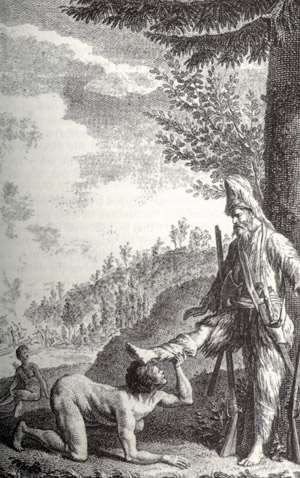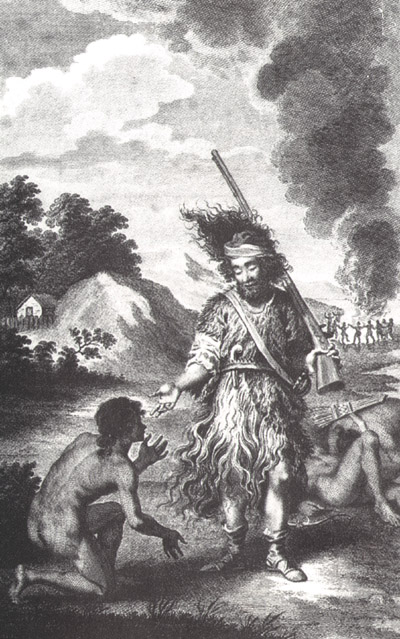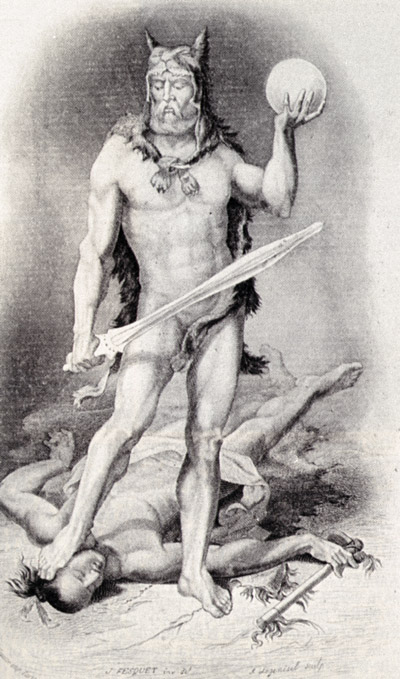
"The true symbol of the British conquest is Robinson Crusoe, who, cast away on a desert island, in his pocket a knife and a pipe, becomes an architect, a carpenter, a knife grinder, an astronomer, a backer, a shipwright, a potter, a saddler, a farmer, a tailor, an umbrella-maker, and a clergyman. He is the true prototype of the British colonist, as Friday (the trusty savage who arrives on an unlucky day) is the symbol of the subject races. The whole Ango-Saxon spirit is in Crusoe: the manly independence; the unconscious cruelty; the persistence; the slow yet efficient intelligence; the sexual apathy; the practical, well-balanced religiousness; the calculating taciturnity. Whoever rereads this simple, moving book in the light of subsequent history cannot help but fall under its prophetic spell." --James Joyce, lecture on Daniel Defoe, 1912
| What is the meaning of Crusoe's first encounter with Friday? |
| 203-204:...and I could then perceive that he stood trembling, as if he had been taken prisoner, and had just been to be killed, as his two enemies were. I beckoned him again to come to me, and gave him all the signs of encouragement that I could think of; and he came nearer and nearer, kneeling down every often or twelve steps, in token of acknowledgment for my saving his life. I smiled at him, and look pleasantly, and beckoned to him to come still nearer. At length he came close to me, and then he kneeled down again, kissed the ground, and laid his head upon the ground, and taking me by the foot, set my foot upon his head. This, it seems, was in token of swearing to be my slave forever. |
Several elements of Fridayís education: what is their purpose?
| What are the qualities Crusoe admires in Friday? |
| 209: But I needed none of all this precaution; for never man had a more faithful, loving, sincere servant than Friday was to me; without passions, sullenness, or designs, perfectly obliged and engaged; his very affections were tied to me like those of a child to a father; and I dare say he would have sacrificed his life for the saving mine, upon any occasion whatsoever. The many testimonies he gave me of this put it out of doubt, and soon convinced me that I needed to use no precautions as to my safety on his account. |
Illustrating Crusoe and the Native:
Marillier-Delvaux (1786):
Ansell-Barolow (1790)

| Justifying our (English enlightenment) colonial project: |
|
209-210: "This frequently gave me occasion to observe, and that with wonder, that however it had pleased God, in His providence, and in the government of the works of His hands, to take from so great a part of the world of His creatures the best uses to which their faculties and the powers of their soul are adapted, yet that He has bestowed upon them the same powers, the same reason, the same affections, the same sentiments of kindness and obligation, the same passions and resentments of wrongs, the same sense of gratitude, sincerity, fidelity, and all the capacities of doing good, and receiving good, that He has give to us; and that when He pleases to offer to them occasions of exerting these, they are as ready, nay, more ready, to apply them to the right uses for which they were bestowed that we are. |
| = God has bestowed the "same powers" (of reason, affection, passion) upon all humans |
| " And this made me very melancholy sometimes, in reflecting, as the several occasions presented, how mean a use we make of all these, even though we have these powers enlightened by the great lamp of instruction, the Spirit of God, and by the knowledge of His Word added to our understanding; and |
| = God has withheld Christian enlightenment from natives like Friday (Crusoe "melancholy") |
|
"...why it has pleased God to hide the like saving knowledge from so many millions of souls, who, if I might judge by this poor savage, would make a much better use of it than we did. From hence, I sometimes was led too far to invade the sovereignity of Providence, and, as it were, arraign the justice of so arbitrary a disposition of things that should hide that light from some, and reveal it to others, and yet expect a like duty from both. |
| =Yet, they "are more ready to apply them to right uses" than we do; with this thought Crusoe questions Godís "sovereignty" in withholding from them the truth he gave us |
|
"But I shut it up, and checked my thoughts with this conclusion: first, that we did not know by what light and law these should be condemned; but that God was necessarily, and, by the nature of His being, infinitely holy and just, so it could not be but that if these creatures were all sentenced to absence from Himself, it was on account of sinning against that light, which, as the Scripture says, was a law to themselves, and by such rules as their consciences would acknowledge to be just, though the foundation was not discovered to us; |
| = Since God is "infinitely holy and just" these "creatures" are all sentenced to absence from God "on account of sinning against that light" (204) |
|
"...and, second, that still, as we are all the clay in the hand of the potter, no vessel could say to Him, "Why hast Thou formed me thus?" But to return to my new companion. I was greatly delighted with him, and made it my business to teach him everything that was proper to make him useful, handy, and helpful; but especially to make him speak, and understand me when I spake. |
| = We are all but "clay in the hand of the Potter" (God): but some humans are more clay than others:) |
| How do you explain the excess in the success of the educational project?: Crusoe's report card |
| Item 1: "I began really to love the creature; and on his side, I believe he loved me more than it was possible for him ever to love anything before" (213) |
| Item 2: Friday as a convert: "The savage was now a good Christian, a much better than I" (220-221) |
| Item 3: Crusoe's offer to let Friday return home: "Take kill Friday, no send Friday away." (226) |
Crusoe as Hercules: Fesquet-Legenisel (1877)

|
Crusoeís Roles: † |
Traveler †††††† | Home-Maker | "Self analysis"† | Teacher | Founder |
| Symbolic†Event | Fatherís Prediction††††† | † Ship-wreck † | Footprint& cannibals† | Saving†Friday † | Vast $ |
| Problem:†the other | the self defined by others†† | wreck as punishment for sin of disobedience | Iím not alone; is the island mine?† | Friday a savage | How rule others |
| Response: | run away from home: become an adventurer | material improvements and spiritual conversion | Not hide & not massacre, but save and destroy | Education | Found his own colony |